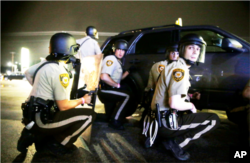Federal law enforcement authorities are trying to figure out why there has been a recent spike in homicides in more than two dozen U.S. cities.
Data released recently by the Major Cities Chiefs Association show first-quarter homicides increased in about half of the 63 police departments represented in the report over the same period a year ago. The other law enforcement agencies said homicide rates remain unchanged or below last year's levels.
There were sharp increases in homicides in Chicago, Dallas, Las Vegas and Los Angeles.
Authorities had no definitive explanation for the uptick.
"I don't know what the answer is, but holy cow, we do have a problem," FBI Director James Comey told reporters Wednesday in Washington.
Ferguson effect, or not?
Comey suggested the homicide increases may be due to what has become known as the "Ferguson effect," a term that spread after a white police officer fatally shot an unarmed African-American man — 18-year-old Michael Brown — in Ferguson, Missouri, in 2014.
The killing, and the protests that followed, helped usher in a new era of police scrutiny, which Comey believes has made police less aggressive.
Darrel Stephens, executive director of the group that released the report, acknowledged that Comey is "not the only one that has that perspective." But, he added, "it's not one that I share."
The FBI director's remarks also drew reaction from White House press secretary Josh Earnest, who, during a briefing with reporters Friday, said, "This administration makes policy decisions that are rooted in evidence, that are rooted in science."
Earnest said that while homicides have undoubtedly increased in some U.S. cities, "There's no evidence at this point to link that surge in violent crime to the so-called viral video effect, or the Ferguson effect."
Other explanations
Other law enforcement officials and criminologists are unsure as to why there were sharp spikes in homicides in some cities, but say they believe contributing factors include a rise in heroin addiction and the accessibility of illegal guns by gang members.
Still, other experts have maintained that conclusions cannot be reached because the data represent only the first three months of 2016 and, despite the recent increase, homicides remain at historic lows.
Stephens emphasized that the numbers do not provide a nationwide snapshot of homicides because the information was compiled from 63 police agencies that represent only the largest cities and counties in the United States.
In the cities that saw the greatest surges in homicides, many were concentrated in certain neighborhoods and, thus "a problem most of America can drive around," Comey said. "It's happening in certain parts of the cities, and the people dying are almost entirely black and Latino men, and we can't drive around that problem."





